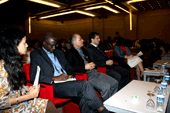LDCs: Civil society calls for a new radical vision
Published on Wed, 2011-05-11 07:37
Source: Civil Society Forum Civil society leaders urged governments to an “urgent and radical shift from the current development paradigm to genuine pro-people development,” and overcome their disagreements to finalise the United Nations Fourth Conference on Least Developed Contries (UNLDC-IV) with a a Programme of Action that can have a real impact on the lives of people. They asked to government delegates this Monday to raise their ambitions and not settle for a weak Programme of Action in order to save face. “We are concerned that the concept of ‘success’ is moving from producing meaningful, quality outcomes to that of reaching agreement by concessions,” said Dr Arjun Karki, Chair of the Civil Society Forum, which has been working towards the Conference and a renewed Programme of Action over the last year. Civil society representatives say that much of what appears to have been agreed in the Istanbul Programme of Action to be finalised and endorsed by governments at the end of the Conference will not help the long-term sustainability of LDCs, as it is simply written in language that was agreed from other processes. For example, much of the agreed language is taken from from the Millennium Development Goals, the South-South Agreement (reached in Nairobi) and the Paris Declaration. “We fear that rather than being a step forward, countries are resting on their laurels, and in some cases are reneging on earlier development agreements”, said Dr M.Ilsan Karaman, Chair of the Turkish Section of Doctors Worldwide. “To achieve a world without LDCs is not just a matter of upscaling resources. We need to be rethinking both the model and the practice of sustainable development”, said Demba Moussa Dembele, President of LDC Watch, an NGO network formed after the last UNLDC Conference in 2001. Civil Society leaders stressed that a world without LDCs needs more than a small increase in ODA, or settling for commitments which are no further than the MDGs. One much talked about issue is the thorough-going reform and regulation of the international financial system. Another is the need to go beyond food security to food sovereignty. The current market approach to commodities encourages speculation and volatility in prices which makes it impossible for small farmers to have a sustainable livelihood. The Civil Society Forum, which was officially launched this Sunday, has a full programme of events and runs concurrently with the Fourth United Nations Conference on Least Developed Countries being held in Istanbul. The CSF welcomes more than 1200 participants from 100 countries. Civil society participants are also attending the official conference to interact with the government delegates. |




